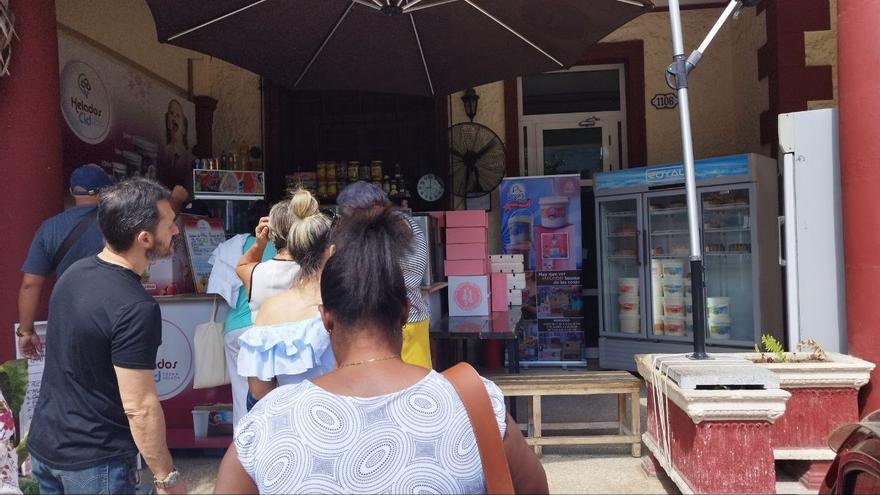
![]() 14ymedio, Pedro Corzo, Miami, October 14, 2023 — Castroite totalitarianism is reinventing itself by launching the rise and development of small enterprises, an activity that would not be possible if the ruling class weren’t strongly involved with the opportunistic objective of preserving power.
14ymedio, Pedro Corzo, Miami, October 14, 2023 — Castroite totalitarianism is reinventing itself by launching the rise and development of small enterprises, an activity that would not be possible if the ruling class weren’t strongly involved with the opportunistic objective of preserving power.
I confess that I do not believe in the good faith of Cuban autocrats. They’ve demonstrated more than enough skill to manipulate the population and other people of good faith, without excluding professional climbers who only seek to promote their own interests. Subjects whom we all know.
The heirs of those who belong to “the new class” — as Yugoslav Milovan Djila would wisely identify them — is greedy for the wealth and wellbeing that competes with the resentment and sectarianism of their predecesors. Nevertheless, they do no want to leave the government, which would mean losing their invaluable prerogatives.
On March 13, 1968, with the so called Revolutionary Offensive — which eliminated close to 60,000 small private businesses that had survived other confiscations by Castroism — Fidel realized his dream of building a kind of trinity comprising him, the Revolution and Cuba.
The confiscations were so absurd, says writer Jose Antonio Albertini, that a high-ranking government official, Carlos Rafael Rodríguez, one of Castro’s loyal servants, opposed the measure alleging that socialist countries like Czechoslovakia and Poland hadn’t implemented that option. The Castros never listened to the claim.
To grow, the ’mipymes’ need the least intrusive government possible, a condition the Cuban authorities never grant, due to their controlling and arbitrary nature
One year later, Christmas was banned on the Island by governmental decree. The regime declared July 25, 26 and 27 official holidays. The caudillo assumed the role of messiah. We had a new national religion with a vanguard of loyalists, which we could have referred to as Castro’s inquisition, supported by mass organizations the leaders of which, to the rythm of songwriters of totalitarianism, emulated the sadly famous Tomás de Torquemada.
Some will remember that, parallel to the scarcity and the snitches of the Committees in Defense of the Revolution, the firing squad was deafening and more jails were built, because death and prisoners were the only thing the regime produced.
Until 1968, we had lived under an iron-clad and bloody dictatorship. As of that date, we began to suffer one of the most severe and disastrous totalitarian regimes to ever exist, accumulating, by imposition, failures, misery and a profound disenchantment among most citizens.
We can’t deny that imposing totalitarianism relied on the complicity of a large number of citizens and that the counteroffensive we live today, contrary to the nature of absolutists, isn’t orphaned by the support of other Cubans on the island and abroad either, which trust that Miguel Diaz-Canel and his servants, through economic freedom, will drive the Island toward democracy, as if Xi Jinping’s China were free.
The extreme poverty created by even the most modest confiscations — barber shops, hair salons and even the closure of the miserly shoe repair establishments — led to strengthening the state bureaucracy with the creation of consolidated enterprises that managed the businesses confiscated by sector.
We cannot deny that imposing totalitarianism relied on the complicity of a large number of citizens
Certainly, although the inefficiency was enthroned in the country, humor was not lacking, people would say that the most important business was Ecochinche — Bedbug Management Company — that horrendous parasite Castroism had imitated to perfection because it has spent more than six decades bleeding the people dry, plundering their allies and stealing from business owners who, trustingly, have invested in their properties.
The micro, small and medium enterprises have always existed and, luckily, many of them were the starting point for large companies that, due to their efficiency and creativity, have been pillars of universal development. However, to grow they all need the least intrusive government possible, conditions the Cuban authorities will never grant, due to their controlling and arbitrary nature.
In any given Latinamerican country, even the poorest, small businesses which are now called mipymes exist. The governments allow them to be created and grow without restrictions, in contrast to what happens on the Castros’ Island, where even to travel abroad a permit is required and the approval of political commissars. From there, my doubts about the legitimacy of management that should benefit Cubans, more than its despots.
Translated by: Silvia Suárez
____________
COLLABORATE WITH OUR WORK: The 14ymedio team is committed to practicing serious journalism that reflects Cuba’s reality in all its depth. Thank you for joining us on this long journey. We invite you to continue supporting us by becoming a member of 14ymedio now. Together we can continue transforming journalism in Cuba.
